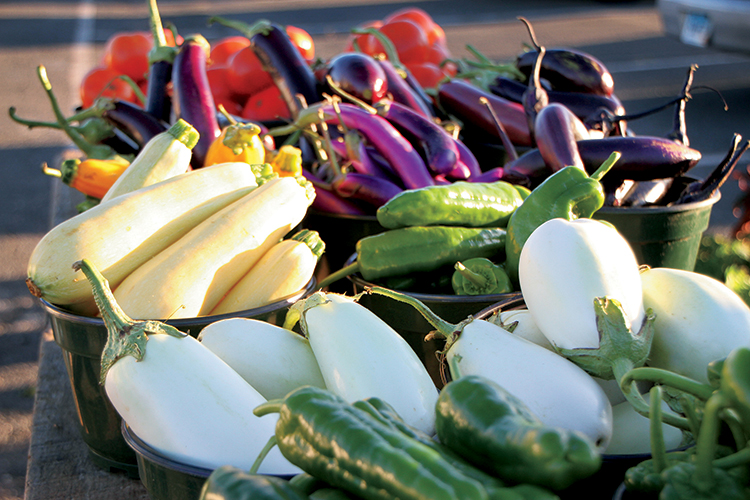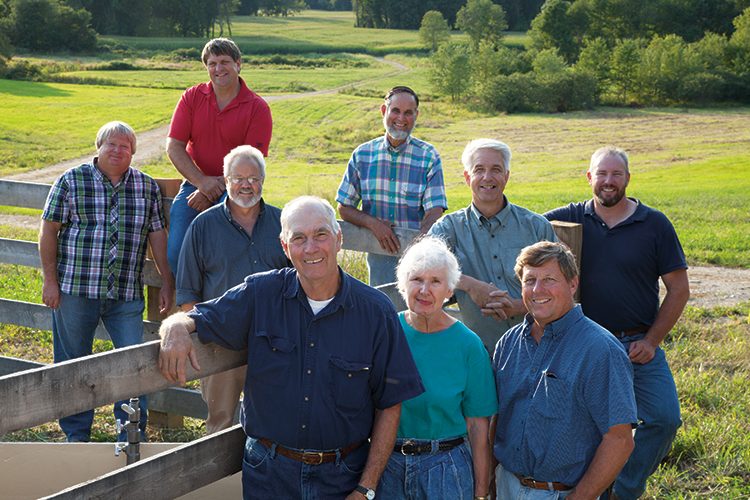Home > Connecticut > Connecticut Farm to Table > Connecticut’s Regional Market Connects People
Connecticut’s Regional Market Connects People
In partnership with: Connecticut Department of Agriculture
 When Alan Hemingway first began distributing his dairy products at the Regional Market, it was from a single pallet space loaned to him by the owner of a wholesale company who leased a large area of cold storage at the facility.
When Alan Hemingway first began distributing his dairy products at the Regional Market, it was from a single pallet space loaned to him by the owner of a wholesale company who leased a large area of cold storage at the facility.
That was two decades ago. Today, Hemingways, a specialty distributor of local, all-natural, commercial and dairy products, leases 9,500 square feet, including the refrigerated warehouse where the company got its start.
“I went from one pallet to four pallets to a trailer load and just kept expanding,” Hemingway says. “Now I have all the room I need, and we are definitely poised for more growth.”
Hemingways is one of the 16 year-round tenants at the Regional Market, a 33-acre, multifaceted distribution facility in the heart of Connecticut.
“They started with one pallet and have grown to 17 trucks and 30 employees,” Connecticut Agriculture Commissioner Steven K. Reviczky says. “This is what the Regional Market is all about and the type of thing we want to encourage.”
In the spirit of continuing relationships like the one Alan Hemingway forged with that first pallet space all those years ago, Hemingways has partnered with a group of small farmers to distribute their dairy and other products.
In 2014, Hemingway met The Farmer’s Cow group at the Regional Market, forming a partnership to distribute milk from the group, which consists of six Connecticut family-owned farms that joined together to brand their milk under one label and market it throughout multiple states.
“This is an example of the synergies that can happen when related businesses work in close proximity,” Reviczky says.
“Agriculture has a trickle-down effect that adds a lot to our economy,” says Robin Chesmer, managing partner of The Farmer’s Cow, “and I’m proud to be a part of that.”

The State’s Major Distribution Hub
The Regional Market is ideally situated between two major highways and is regarded as the largest perishable food distribution facility between Boston and New York City.
Since its construction in the early 1950s, the market has served as a central distribution location for state farmers and wholesalers of food and other ag products.
While many consumers visit the facility for its farmers’ market in the warm months, the Regional Market primarily serves as a hub for food aggregation, distribution and light processing services that are extremely important.
“The market is distributing year round,” says Linda Piotrowicz, bureau director for agricultural development, resource preservation, and the Regional Market at the Connecticut Department of Agriculture.
“It distributes to retailers, schools, institutions and healthcare facilities 24 hours a day, seven days a week. Even during blizzards, food is moving through this facility.”
The economic impact of the Regional Market is significant. In recent years, tenants have reported sales of approximately $200 million and jobs for about 500 people.
Revitalizing the Market
The Connecticut Department of Agriculture has partnered with the Connecticut Department of Administrative Services’ Division of Construction Services to develop a master plan for the Regional Market to revitalize and modernize the facility. It addresses current and evolving food safety and operational requirements, and develops a vision for its future. The master plan estimates a 10-year economic impact of more than $2.3 billion.
This plan includes reconstruction of the market to provide modern, code-compliant and efficient facilities for the sale, processing and distribution of agricultural products, and new farmers’ market facilities that will attract local buyers.
“Consumers benefit from the Regional Market in many ways, including access to fresh, nutritious food and the economic stimulus from the activity there,” Piotrowicz says.
The Farmer’s Cow Farms
The six farms that make up The Farmer’s Cow are open to the public and encourage visitors to see their cows and learn about dairy farming.
The six farms include: Cushman Farm, Franklin; Fairvue Farms, Woodstock; Fort Hill Farms, Thompson; Graywall Farms, Lebanon; Hytone Farm, Coventry; and Mapleleaf Farm, Hebron. Combined, these farms have more than 5,000 cows (milking and young stock) producing nearly 23,000 gallons of milk per day.
With a strong commitment to maintaining farmland for future generations, The Farmer’s Cow members have permanently protected more than 2,100 acres of their farmland.
In addition to dairy products, the farm partnership also sells locally sourced eggs, apple cider, summer beverages and locally roasted coffee, and operates a restaurant called The Farmer’s Cow Calfe.



